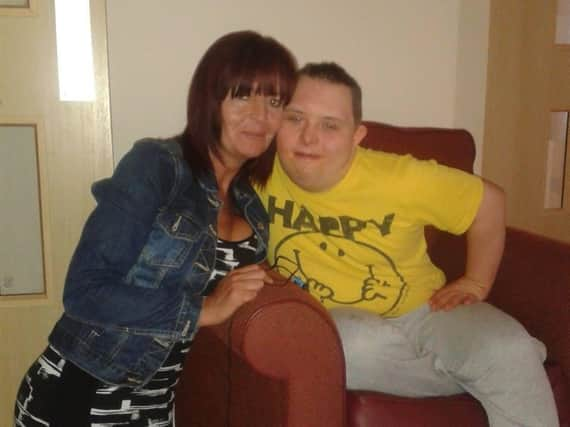Bradford mother whose son, 20, died of a chest infection says inquest failed to explore failings in his care


The mother of a young man with Down’s Syndrome and autism who died after collapsing in a private care home says the coronial process has failed to examine wider failings in his care.
Paula Rawnsley has fought for more than five years for a full investigation into the death of her son Thomas Rawnsley, 20, who died from a heart attack after he collapsed at the Kingdom House home, in Sheffield, after suffering from a chest infection.
Advertisement
Hide AdAdvertisement
Hide AdMrs Rawnsley, from Wibsey, Bradford, said she was hoping an inquest, which concluded in Sheffield on Wednesday after sitting for nearly four weeks, would examine the background to the death of her son, who had been transferred to Sheffield against his family’s wishes.
But an inquest jury of seven women and two men concluded that Mr Rawnsley died of natural causes on the direction of Sheffield assistant coroner Abigail Combes.
Ms Combes told the jury that, despite listening to evidence since the beginning of September, natural causes was the only conclusion available for them to reach.
This followed a legal ruling she made on Tuesday which meant the jury was barred from considering the wider circumstances of Mr Rawnsley’s care and had to focus on the immediate causes of his death.
Advertisement
Hide AdAdvertisement
Hide AdFollowing the hearing at Sheffield Town Hall, Mrs Rawnsley said: “When he was moved to Sheffield to a ‘specialist service’ run by Lifeways, this was against his and our wishes.
“Thomas’s physical and mental health declined rapidly and his family screamed out for help.
“Six months later he was dead.”
Mrs Rawnsley said: “We trusted in the coronial process however the inquest wasn’t able to examine any of the wider failings in care, the abuse he suffered, the lack of trauma support or why Thomas couldn’t live in his local community.
“It simply looked at the last five days of his life.”
She said: “I have found the process extremely distressing especially as it continued during a pandemic and during a national lockdown.
Advertisement
Hide AdAdvertisement
Hide Ad“The jury were instructed that the only finding they could reach was that Thomas died from natural causes. We are left wondering how it can be natural for a fit and healthy 20-year-old to die from a chest infection.”
Mrs Rawnsley said: “Thomas was a beautiful, loving, compassionate and most of all mischievous little boy.
“He enjoyed spending time with his family and was loved like only a youngest brother to three big sisters can be.
“Thomas was a very much loved son, brother and uncle.”
Giving evidence at the inquest Mrs Rawnsley described the battles she has had over the years to find the right care for her son.
Advertisement
Hide AdAdvertisement
Hide AdDuring spells in a home in Liversedge, West Yorkshire, in 2012 and 2013 he was abused by a care worker who bent back his fingers and threatened to break them.
This worker was given a suspended jail sentence and ordered to do community service.
Mrs Rawnsley explained how Mr Rawnsley was placed at Kingdom House, operated by the firm Lifeways, in July 2014 by order of the Court of Protection from an Assessment and Treatment Unit in Bradford which struggled to cope with his complex needs.
She told the jury her son deteriorated during his time in Sheffield, telling the inquest: “I felt I was banging my head against a brick wall and things were getting more and more desperate.”
Advertisement
Hide AdAdvertisement
Hide AdShe said: “Thomas needed listening to and I was being dismissed.”
He suffered a cardiac arrest on February 2, 2015, brought on by a chest infection and died two days later in hospital.
Sebastian Del Monte, of Hodge Jones & Allen Solicitors, acting on behalf of Thomas’s family, said: “Thomas’s death is yet another example of how individuals with learning disabilities are failed in a health and care system ill-equipped to assist adults with complex care needs.”
Comment Guidelines
National World encourages reader discussion on our stories. User feedback, insights and back-and-forth exchanges add a rich layer of context to reporting. Please review our Community Guidelines before commenting.